Sack all the tipsters. With all sides entering Round 3 with a win and a loss to their name, all conventional wisdom pointed to New Zealand and South Africa beginning to assert themselves, and fighting it out for the title.
But what’s conventional wisdom, I hear you say?
The way things are going, this time next week, we could well be back where we started; teams unable to bring the required intensity and accuracy in successive weeks, losing to motivated opponents with a point to prove. Every side with two wins and two losses.
Or not. After all, there was nothing in the performance of the Wallabies or Pumas that was so freakish or out of the ordinary that couldn’t be repeated.
Perhaps in normal circumstances, a ‘normal’ winger corner-flagging in defence might have arrived too late to prevent Makazole Mapimpi diving over in the corner just before halftime.
Or perhaps the tackle made by Marikia Koroibete that sent Mapimpi into orbit, in the direction of the Adelaide Oval boundary fence, had it been made by any other player, would have been considered freakish?
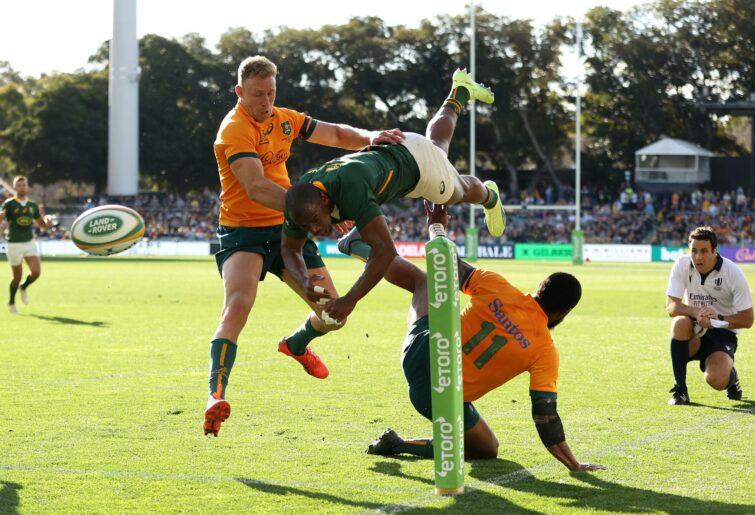
What a tackle. (Photo by Mark Kolbe/Getty Images)
But where Koroibete is concerned, there was nothing freakish about the urgency he displayed, covering Tom Wright’s vacant wing as well as his own, sprinting as hard as he could to be in position to make the tackle. That kind of play – hard work off the ball, busting a gut to get himself involved at every opportunity – is par for the course for Koroibete.
Is it nit-picking to say that, in the execution, he got his head on the wrong side? For those who know golf, that’s a bit like complaining about Jim Furyk having a dodgy swing. Twenty-nine professional wins, including the 2003 US Open, say that in elite sport, it’s not always about how you go about things, it’s about how you finish things.
In the Wallabies’ case, given their muddling openings so far this year, it’s also about how you start things.
This time it all came together from the kick-off; great hustle by Rory Arnold off a perfect Nic White kick, Koroibete recovering a loose pass and keeping the attack moving, Tom Wright, Matt Philip and Alan Ala’alatoa all with deft, precise off-loads, sending a dashing Fraser Mc Reight across the try-line.
Add in Noah Lolesio’s conversion and that’s over half the side with a positive involvement in the first 90 seconds; the very definition of a hot start.
Just as importantly, the Wallabies claimed the kick-off, exited effectively, and continued to dominate field position and the ball to the extent that the South Africa’s first meaningful possession – and first touch for halfback Faf de Klerk – didn’t come until the 13th minute!
By this stage, with the Wallabies up by 10 points, an excited Sonny Bill Williams was praising Len Ikitau and Hunter Paisami for their “involving involvements”, and the sniff of something special was in the air.
Roar rugby experts Brett McKay, Jim Tucker and Harry Jones and editor Tony Harper come together for the post-mortem after the Wallabies’ incredible 25-17 win over South Africa as well as Argentina’s historic 25-18 win over New Zealand in Christchurch.
Gradually, the Boks found their feet, the possession shift a result of pressure on the Wallabies’ lineout. By the end of his shift, Folau Fainga’a had seen five of his lineout throws go west, been free-kicked at a scrum and been penalised for a ‘no-wrapping’ tackle; one of the few home players not to enhance his reputation.
But despite almost total domination of the second quarter, pressuring the Wallabies into giving up penalties, drawing a blatant offside tackle by Tom Wright which saw him receive a yellow card, the visitors were only able to claw back three points.
Part of that was Koroibete’s doing, part Handre Pollard tugging two kicks to the left side, and part good, old-fashioned, roll your sleeves up grunt work from a pack determined not to be dominated at maul or scrum.
South Africa weren’t helped, immediately before and after halftime by the decision of referee Paul Williams to send De Klerk to the sin bin, for slapping the face of White as he tried to clear a defensive scrum.
While there was contact made, this was not the forceful connection everyone understands needs to be eliminated from the game. Williams – who had a calm, steady match – seemed to suggest that once contact with the head had occurred, he had no choice but to sit De Klerk down.
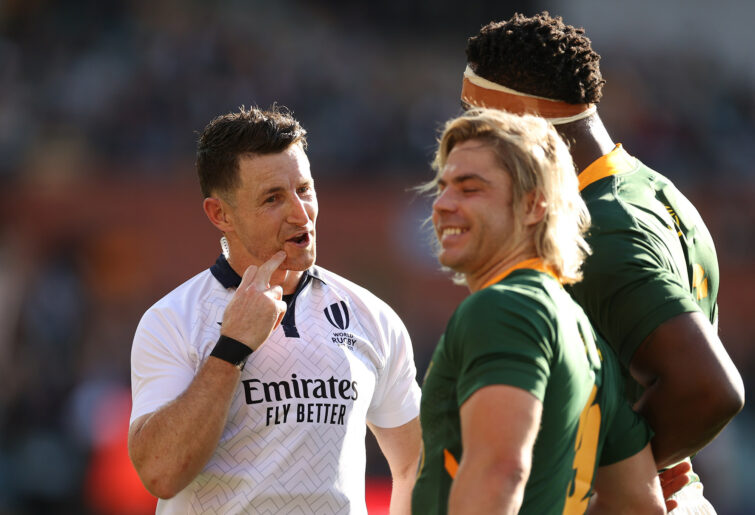
Referee Paul Williams talks to Faf de Klerk of the Springboks. (Photo by Mark Kolbe/Getty Images)
If that’s the case, De Klerk might care to look at recent video of England’s Jonny Hill’s work on Darcy Swain and wonder at the injustice of it all.
As for White, the best that can be said is that the Adelaide constabulary’s search for a sniper-at-large is still ongoing. And at least we can all be spared any more pious pontifications about France’s 2021 touring captain, Anthony Jelonch. Hey, our guys do it too!
A typical Australian rugby trait is how interstate rivalry bleeds into blind criticism built on parochial state lines. In this instance, recent howls about a Brumbies-led takeover of the Wallabies were ramped up even further after Laurie Fisher joined the inner sanctum at the same time Matt Taylor headed in the other direction.
But in the 56th minute it was a trademark Brumbies move – James Slipper posted one off the ruck, turning the ball back in to a fast-running player – which effectively killed off South Africa; McReight crossing for his second try.
That running player was another Brumby – Lolesio – who showed growing confidence with a back-of-the-hand final pass, mixed with assured game-management and intelligent deep kicking.
Preceding that try came another superb ensemble effort; a looping pass from White allowing Wright to gas it down the right flank, Reece Hodge showing impressive strength and composure to keep the move alive, Ikitau stepping sweetly towards the posts, before Koroibete left Pollard grabbing only air as he finished off emphatically.
So, as quickly as it was flushed down a San Juan toilet, the Wallabies’ season is once again back on track. The two late tries conceded to Kwagga Smith were disappointing, coming at the cost of a winning bonus point, but that’s a minor quibble on what was a satisfying day.
As for South Africa, incredibly without a win in Australia since 2013, where does this leave Jacques Nienaber and his side?
For starters, they’re just like any team unable to stamp their authority and presence on a match if they don’t have the ball. Imagine what odds betting agencies would have offered on De Klerk’s first – and only – box kick not coming until the 53rd minute?
Perhaps the Boks will think that on any other day, the pressure they exerted on the Wallabies’ line in the period prior to half-time would have yielded them points; Ox Nche would have been ruled to have found grass, and they will determine that there is no need to panic and change course.
That may well be the case, nevertheless some familiar failings surfaced, most notably a tendency for the backline to play too far behind the gain line. There was also a strange lack of intent and intensity to much of the forward work; missing mongrel, to use a technical term.
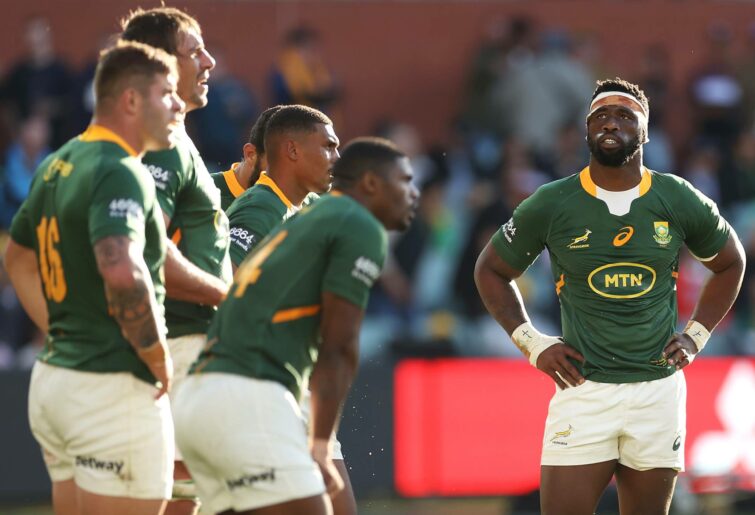
(Photo by Mark Kolbe/Getty Images)
Expect the temperature gauge to be set a few degrees higher, next week in Sydney.
Things were certainly cooking in the Argentine dressing room after their historic first victory in New Zealand, by 25-18 in Christchurch. This was a victory built on unimpeachable defence; which was not only accurate (192 tackles at 96 per cent efficiency), but physically dominant.
It mattered little that the Pumas rarely threatened on attack; presented with a single opportunity courtesy of Scott Barrett shelling a kick-off receipt, they made it count, flanker Juan-Martin Gonzalez racing away for his now obligatory try.
With Emiliano Boffelli continuing on in a rare vein of form from the tee, the Pumas were able to keep the scoreboard ticking over at regular intervals and, once they extended their lead entering the final quarter, there was always a sense of a triumphant homecoming for Pablo Matera.
As immense as Matera was, he comprises only one-fifth of what has become one of rugby’s most potent 4-8, lock and loose-forward combinations. All of them are strong, broad-shouldered men, who plug up the centre channels and make their tackles count.
Even when the All Blacks found some continuity, got their recycle game going and punched runners into the defensive line, the Pumas yielded no more than a bend, never a break.
If the All Blacks are to turn things around next week in Hamilton, they will need to be far smarter about devising a plan through, around and over the Pumas defence.
They will also need to stay on the right side of the referee. Georgian Nika Amashukeli punished them 14 times, a number of those for technical offences when in possession. Not only did the All Blacks pay through Boffelli’s boot, it stymied their ability to bring their dangerous wingers, Caleb Clarke and Will Jordan, into the game more.
Another urgent work-on is the lineout; smooth and functional in Johannesburg, but put under heavy pressure here by the Pumas’ competitiveness. Even some of the ball won was scrappy, and when three times in the second half, the All Blacks kicked to an attacking line-out in the 22, they coughed it up.
While it might feel harsh to single out players for a team loss, on 2022 form, it’s hard to recall any All Black of recent times who has regressed as quickly as Codie Taylor.
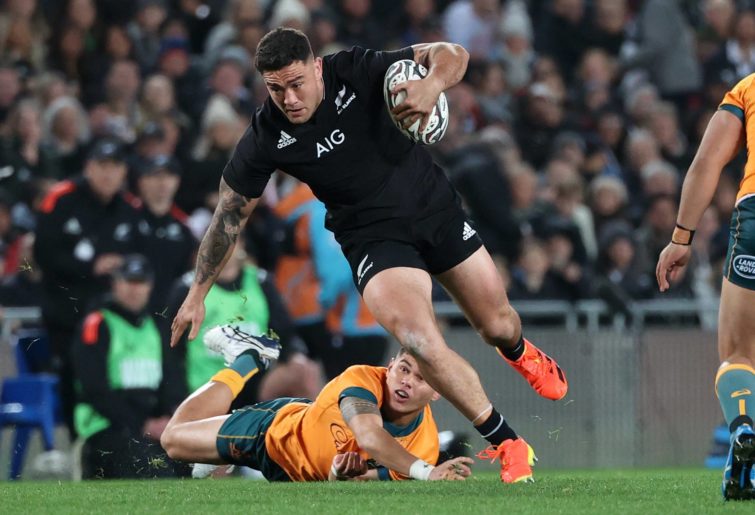
(Photo by Fiona Goodall/Getty Images)
Others might point to skipper Sam Cane, albeit Cane has always had his defensive contributions to fall back on. But this match was more about the All Blacks’ attack; the Pumas daring the home side to throw their best shots.
Individually, this is not Cane’s natural skill set, and on a couple of occasions he was easily handled in contact, before he was replaced by Akira Ioane. He will get his shot at redemption in Hamilton, but the drums are beating more loudly.
Those same drums are thundering still about the coaching situation, which predictably went into overdrive again as soon as the final whistle had blown.
Depending on your point of view, NZ Rugby has made their call and moved on, or has painted themselves into a corner. But any expectation that Ian Foster is going to be re-prosecuted after every single match, is misplaced.
For better or worse a re-jigged coaching team is in place and they will now be allowed to show what they can do.
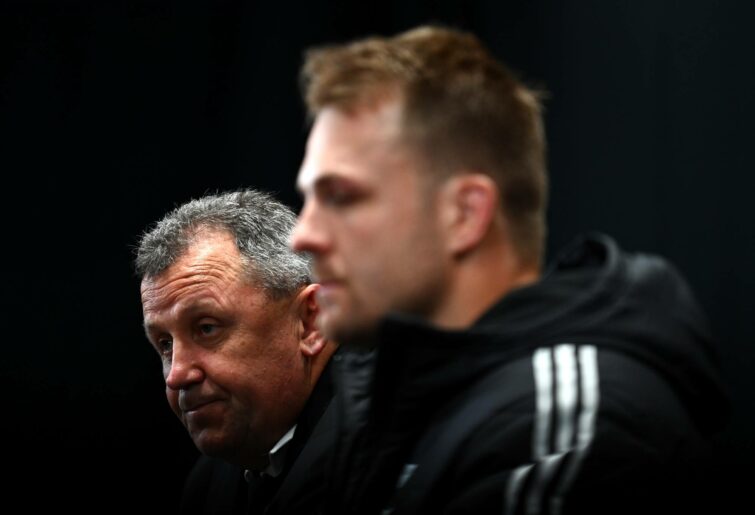
(Photo by Hannah Peters/Getty Images)
Which, according to betting agencies yesterday which listed the All Blacks as $1.62 favourite, may still be to win the Rugby Championship.
Noticeably, there was nary a mention of Joe Schmidt’s contribution to the loss – on one hand because it would be ridiculous to assign that to him, and on the other, because Schmidt would almost certainly have been singled out had the All Blacks won.
The truth is – an unpalatable as it might be for New Zealand fans – all four competing sides are very much like each other.
At halftime this felt like an All Blacks versus Pumas match of old. The All Blacks had withstood the best of the Pumas attack and, eventually finding some space on the outside, taken the lead with the promise of breaking things open in the second half as the visitors tired.
That’s not how things fly in 2022. The Pumas are better conditioned, well-coached, more experienced, carry a deeper bench and, most of all, are full of self-belief.
Until a new generation of special players comes along – if indeed they are coming – this is something that All Blacks fans are going to have to come to terms with. They have a side good enough to beat any opposition on their day. Just not every day.
A common theme so far in this tournament has been media and fans from all sides making definitive judgments and being too quick to write their team off after a loss.
That’s a flawed approach in a competition as tight as this one. The road travelled between the outhouse and the penthouse, and vice-versa, is as short as a Stephen Perofeta match review.
Whichever team you support, hold your horses. This Rugby Championship still has a long way to run.

































































































